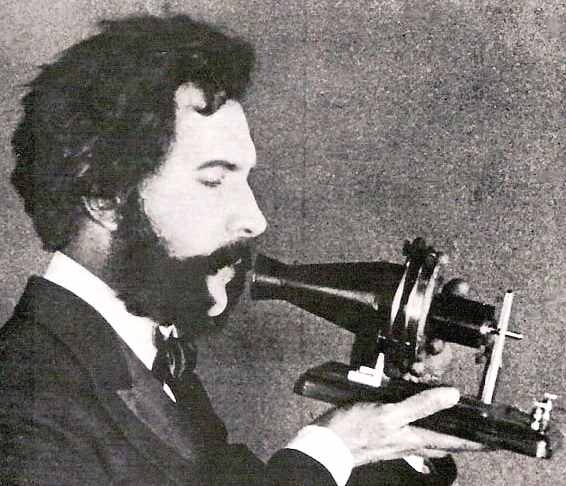On March 7, 1876 Alexander Graham Bell patented the telephone. This post will not give you any insight into how the telephone works, for I do not know nor will I ever be able to comprehend it. I am satisfied believing that it, along with the fax and the internet are magical boxes that can manage to get my thoughts from inside my brain over to you. That is enough for me.
 |
|||
| Alexander Graham Bell speaking into the telephone |
You’ve probably all heard the story of Bell’s first words to his assistant, Thomas Watson. If you have not, well, here they are: “Mr. Watson, come here. I want you.” They are words now spoken over the telephone by bosses throughout the world. And, while I’m sure that Watson was thrilled that the invention for which they’d just secured a patent worked, he probably didn’t realize that the boss would now have a much easier time of being a pain in the ass getting a hold of him. Bell would no longer have to stop what he was doing, get out of his seat and scurry down the hall to get trusty Mr. Watson. Now Watson was just a phone call away. Awesome for Watson, huh? Ever wonder why we never hear how Watson responded to his boss? Probably he said “Right away, sir” but was thinking “Crap, I know how this is going to go.” Anyway. . .
 |
|||||||||
| Can you hear me now? |
Early telephones were handled by switchboard operators. Most of us imagine lines of women “Operator, Madison 611 please” but, in fact, early switchboard operators were boys, who, according to this video, were rude and abusive. The telephone actually created an occupation for women. Mostly because women didn’t swear at the customers. (They also weren’t allowed to cross their legs or wipe their brows. Because um, you can see that over the phone, right?)
And now, we don’t ever talk anymore.
If you feel strongly enough about something to take the chance of putting your opinions out there for all to see, and suffering the slings and arrows of those who disagree, then you’ve both accomplished something and deserve the respect of those too gutless or lazy to try it themselves. I may be a bit less sanguine about the prospects of creating a successful blawg, having see way too many arrive and die unseemly deaths, but I certainly respect the effort.
It’s now happened to me three times in three months. There I was at John Hochfelder’s New York Injury Cases Blog doing research on damages, before I turned to the usual suspects of Westlaw or the New York Jury Verdict Reporter.
I’m not sure if Turk picks up the phone to call people to get information on damages as well, but that would take an awful long time and he’d have to call an awful lot of folk. And, if lawyers are honest, they’ll admit that more often than not they’ll turn to blogs for an easy to understand analysis of a case or statute before turning to a law review article or hell, even before reading the case or statute itself. So are blogs dying, dead, on life support? I say, they are as alive and well as ever. And, while the telephone might have killed the handwritten, snail mail letter, twitter has not killed the blog – yet.
Speaking of dead and communication.
In a decision that basically all but over-ruled their decision in Crawford v. Washington, the Supreme Court held that dead men can, indeed talk (but only to police officers, everyone knows they can’t actually use a telephone, or blawg.) Gamso lays out the facts and holding quite succinctly:
Here’s the very short version of the facts. Police are called to a gas station where Anthony Covington is lying on the ground by his car, a gunshot wound to the abdomen, and seemingly (here’s a surprise) “in great pain.” Police questioned him for 5-10 minutes. Covington told them that “Rick” shot him. Covington died within an hour or so after EMTs arrived and took him to the hospital. Richard Bryant was arrested, tried, convicted. Covington’s statements were admitted at the trial.
In an opinion by Sotomayor (for herself, Roberts, Kennedy, Breyer, and Alito), the Court explains that Covington’s statements weren’t testimonial because there was this ongoing emergency the police were concerned about and that was the “primary purpose” of the questioning. And that’s to be determined by – here’s Sotomayor.
In making the primary purpose determination,standard rules of hearsay, designed to identify some statements as reliable, will be relevant. Where no such pri-mary purpose exists, the admissibility of a statement is the concern of state and federal rules of evidence, not the Confrontation Clause.
The Confrontation Blog (which is devoted entirely to post-Crawford cases and analysis, wonder what it’s gonna write about now) offers some pretty in depth thoughts and analysis on what the decision means for those of us in the trenches:
So one of my concerns is that police officers will quickly learn that they can get statements characterized as non-testimonial if they testify, in effect, “I came up to the scene and didn’t know what was happening. My principal concern was securing the public safety. What this person told me was very important for that purpose.” They will also have an incentive to gather as much information as possible before the situation is fully under control; thus, the decision in this case distorts their incentives in performing their policing function. And once they do control the situation, if they can no longer make a credible contention that they had some primary purpose other than evidence gathering, then they can pass the witness – so I may continue to call the person who makes a statement while understanding its likely future prosecutorial use – on to a social worker, whose “primary purpose,” of course, will be therapeutic, notwithstanding the fact that in performing that function she repeatedly learns, and relays to juries, information that turns out to be useful in prosecuting crime.
And, in a blawg I’ve recently discovered, Preaching to the Choir, the problem with the decision is laid out quite clearly:
The Sixth Amendment guarantees the right to confront an accuser. In this case, the victim’s statement that “Rick shot me” was allowed to come in at trial even though the defendant never got to confront that victim. Really, nothing else should matter. The defendant was accused but had no opportunity to confront the accuser. It really should be easy. Boy, did the court blow this one.
Well, Sarah, what about Zombies, huh? I mean, we could confront a zombie, couldn’t we? Maybe that’s what the Court really meant.
 |
|
| Crap, maybe zombies can use the phone. |
If I call you, what shall we talk about?
Well, according to the Supreme Court, we can talk about anything. Really, anything. Because while we may have lost our Sixth Amendment (again) and we have been in a constant steady state of losing our Fourth, the First is alive and well (we don’t need any talking zombies for this one but THEY ARE HERE ANYWAY). In Snyder v. Phelps, the Court held the Westboro Baptist Church, otherwise known as the “God hates Fags” church, had every right to spew forth it’s rabid hate at military funerals. Initially that just feels wrong, right? I mean, people should not be allowed to say hateful, disgusting things at the funeral of those men and women that have fallen for us. Except that they should be. As the non-word-mincer Marc Randazza said at the Legal Satyricon:
To understand this case, you must unplug your emotional reaction to the speech that brought about the case in the first place. The fact is, nobody likes the Westboro Baptist Church. Or, more to the point, nobody worth a damn does. If you are one of the three people in America who does not know about Westboro, here it is: Westboro is a “church” made up of some lowlives from Kansas. These lowlives believe that there is a magic zombie who lives in space. By the way, the space zombie is Jewish. They think that the space zombie, and his father, who is the same person as the zombie, wrote a book. They also believe that this book says that homosexuals are bad. (mmmkay?).
As if that isn’t nutty enough, they also believe that the United States is too nice to homosexuals, and therefore this magic space zombie jew and his father (who is the same person as the magic space zombie jew) do bad things to America and Americans to punish us all for not killing homosexuals. To demonstrate this belief, the Westboro members go to funerals for soldiers killed in combat, and they hold up signs that say “GOD HATES FAGS” and “THANK GOD FOR DEAD SOLDIERS”.
Naturally, this chaps the ass of the families of the dead soldiers. It chaps my ass too. Were I the benevolent dictator of this country, I might very well have the Westboro followers rounded up, shoved into a wood chipper, and we would all live happily ever after. Of course, once I was done with that, my taste for blood would be unquenchable, and next thing you know, 100 million people would be run through the wood chipper before I got to half the people who piss me off.
This is a hell of a victory for free speech. We live in a political environment where the Right wing wants to limit all speech that criticizes the war and the Left wants to limit all speech that hurts anyone’s feelings. With that backdrop, this decision will make very few people happy. Veterans and Republicans will go all Walter Sobchak about Vietnam and 9/11. The PC crowd and the Democrats will whine into their tofu and lentils as they piss and moan that the First Amendment should not protect speech that makes someone feel bad. Most average Americans will say, “that just doesn’t seem right.”
At Above the Law, Elie Mystal concentrates on Sam Alito’s dissent. The title of the post is brilliant: Unless You are a Corporation, Sam Alito Wants You to STFU. Now, in case you didn’t know, Alito was the lone dissent in Snyder, he was the lone dissent in Stevens which held that animal crush videos were protected by the First Amendment (hey, whatever floats your boat) but voted in favor of Citizens United, which said that corporations were persons who had, uh, free speech:
I can’t wait until Sam “Not True” Alito writes a book or something explaining why regular people don’t deserve the free speech given to American corporations and sitting Supreme Court justices…
Greenfield, on the other hand, applauds Alito, saying that
And the lone dissenter, Sam Alito, knowing full well that his position would neither change the direction of First Amendment protections nor satisfy the need to fashion a means by which the most disgusting and offensive among us could be shut down without touching the right of anyone else, took the bullet for the Court.
I don’t necessarily agree with Mr. G that Alito ‘took the bullet’ for the Court, particularly in light of his previous rulings, but this ain’t my forum for that. This is just for telling. Right? Just the facts, ma’am, just the facts.
 |
|
| They really do just hate everyone. |
But if you crank call me I will haul your ass into court.
If you haven’t ever made a prank phone call you are lame or you weren’t able to use the telephone before the advent of call waiting. See, in the olden days we used to be able to just dial the phone and say stuff, anything to anyone because no one knew who we were or where we were calling from. I mean, there were probably ways for people to find out but we didn’t know what they were. There was that *69 thing that came around that would call back the last number that dialed you. Ohhhh, that was so advanced. But otherwise you could call and say things as dumb as “Is your refrigerator running? Well, you’d better go catch it.” Or you could have pranks as complex as the ones my husband would do. See, he can do a fabulous radio announcer voice so he would call people up and tell them they’d won a new car from some radio contest. Hilarious. But the great state of Wisconsin wants to criminalize prank phone calls. Why? Because their governor got one and it made him look like a wienie. Johnathan Turley gives us some insight into the law, which mirrors language of the federal law enacted in December of last year making it a crime to cause a caller ID to transmit misleading information. Huffington Post reporter Jason Linkins speaks the truth when he writes:
Aren’t there already laws against fraud and harassment and terrifying people in Wisconsin? Because this sort of makes it look like legislators are primarily motivated by the need to make “making Scott Walker look stupid” a criminal offense.
The bill would make it a crime to disguise your voice or give out a fake phone number. Really? I mean, come on. Really? And, in fact, while searching the world wide computer for other blog posts about this topic I came across one that was entitled “Are they” by a fellow named David Breston out of Texas:
really thinking about ‘criminalizing prank phone calls in Wisconsin that may make the current state governor look a little – foolish, inane, gullible, moronic, slow…However, when the party that is in power chooses to – for want of a better term – hijack the legislative process for the purpose of preventing their buddies from ending up with egg on their face – well, I suggest the American public would not be fully in support of this.
Ah, Mr. Breston, I disagree with you. I’m fairly certain a good segment of the American public would love this law, as they love almost any and all laws that criminalize whatever. The problem is the name. Will it be called “Walker’s Law” or “Scott’s Law”? I’d go with Scott’s Law, a bit more personable and folksy, makes it sound like something really nefarious happened to Scott. The public loves that. And, in other news, it turns out that perhaps the prank caller is already guilty of identity theft, at least according to Associate Professor William Jacobson at Cornell Law School who. Thank God, because I was starting to worry that it might just have been a dumb prank phone call.
And in case you didn’t think it possible, there are now love songs about the internet. You think I lie?
And I leave you with the words from a man of letters.
Robert Frost: Telephone
There was an hour
All still
When leaning with my head again a flower
I heard you talk.
Don’t say I didn’t, for I heard you say–
You spoke from that flower on the window sill-
Do you remember what it was you said?’
‘First tell me what it was you thought you heard.’
‘Having found the flower and driven a bee away,
I leaned on my head
And holding by the stalk,
I listened and I thought I caught the word–
What was it? Did you call me by my name?
Or did you say–
Someone said “Come” — I heard it as I bowed.’
‘I may have thought as much, but not aloud.’
Blawg Review has information about next week’s host, and instructions how to get your blawg posts reviewed in upcoming issues.





Interesting blog review and nice spin, as always.
But, 2 clarifications.
1. I am not a legal marketer. I am an attorney, legal author and speaker. I write and speak about the intersection of law and technology. I do not charge people for marketing advice. I never have and don't intend to start doing so.
2. My blog post at Sui Generis (which is a re-print of my nationally syndicated Daily Record article) was not about marketing. It was about how blogging is changing for lawyers over time. Those interested in the actual content of the post are welcome to head on over and read it.
What writer's block?
Rob R.
Great piece. Nicely wrapped the cord around disparate legal posts.
And if you don't mind me dropping a link into your comments, I had this music coursing through my head as I read your review:
http://www.youtube.com/watch?v=CIcdNjG1Jlg
–Eric T.
Like Turk, the same song went through my head asI first read this blawg review. But then I thought, it was too obvious, and then another popped into my head in its place.
I dedicate it to my clarified pal, Niki, attorney, legal author and speaker. If you feel the need to speak, Niki . . .
http://www.youtube.com/watch?v=mULAf_7LmeI
I must not be a very good reader. I didn't see where this post called Niki a legal marketer, or that her post was about marketing.
But maybe I'm misunderstanding Niki's comment here, because she didn't actually say you said that. I'm just going off the conversational implicature I thought her comment carried.
Anyway, this is thought-provoking: I wonder if what you said about the impact of technological change on communication explains why the Supremes want free — even unchallengeable — speech for non-humans, dead humans, and humans who excoriate the dead.
It's a perverse form of nostalgia.
Any post that has a picture of Alexander Graham Bell using a bong is cool in my book.
I hope you'll publish this comment despite the fact that I'm just an attorney, not an author or speaker with a nationally syndicated article.
I'm just a member of the unwashed masses, seeking to compliment you on a very good Blawg Review.